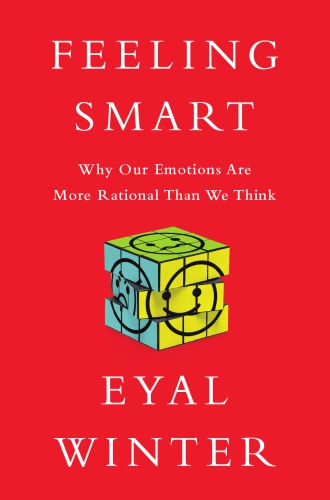
Feeling Smart
Why Our Emotions Are More Rational Than We Think
کتاب های مرتبط
- اطلاعات
- نقد و بررسی
- دیدگاه کاربران
نقد و بررسی

October 20, 2014
Economist Winter looks at the relationship between emotion and rationality in this study, and if the results do not fully answer the questions he raises, he still gives plentiful insights into the many factors that govern our choices. The book’s central thesis is that being emotional and being rational are not the diametrically opposed states people often assume them to be, and that, far from clouding judgment, instinctive feelings play an essential role in guiding it. Winter draws on the classic Prisoner’s Dilemma to illustrate this point, applying a mathematical model to the apparently unsystematic process of decision making. Even anger, within this framework, is persuasively shown to have an instructive purpose. Winter struggles, however, to tie all of the examples covered to the central theme of emotion. In particular, an extended passage that examines and questions clichés about gender and sexuality (such as “Men, more than women, seek physically attractive mates” and “Homosexuality provides no evolutionary advantage”) wanders far afield from the emotion-reason dichotomy. But even if the book doesn’t completely fulfill its goal of collapsing the divide between feelings and reason, we can at least begin, with its help, to reason with our emotions through their inherent foundation of rationality. Agent: Jim Levine, Levine Greenberg Rostan.

November 1, 2014
A Humboldt Prize-winning Israeli scholar of behavioral economics advances the concept of rational emotions in a book filled with fascinating studies and personal anecdotes.Winter (Economics and Director of the Center for the Study of Rationality/Hebrew Univ. of Jerusalem) turns to game theory, the study of interactive decisions, for explanations of how emotional behavior can bring about cooperation in situations in which rational behavior fails to do so. In the classic prisoner's dilemma, for example, the author sees that an emotional need for reciprocity is the main motivation for cooperation. Treading the line between economics and psychology, Winter rejects the idea that the brain has separate mechanisms for emotional behavior and rational behavior. In his view, the two systems are intertwined and constantly in dialogue, with our emotions helping us to make rational decisions because our emotional behavior creates the possibility of influencing the behaviors of others. Besides his frequent references to the work of other economists, many of them Nobel Prize winners, and to the research experiments of psychologists, Winter often turns to his own life to make his points. A study of the difference in work habits of northern and southern Italians, an experiment revealing the cultural differences among Israeli, Chinese and Palestinian players in a game of giving and taking, and the risk-taking behaviors of bomber pilots in World War II are all woven into a narrative that includes a story about his aunts' food negotiations at holiday meals and his cool, poker-playing uncle's ability to win by reading the faces of the other players. No special knowledge of game theory or of economic theory is required to follow Winter's arguments, and his insights about human behavior range over a variety of areas: politics, religion, sex, marriage and art. A lively, accessible work.
COPYRIGHT(2014) Kirkus Reviews, ALL RIGHTS RESERVED.

























دیدگاه کاربران